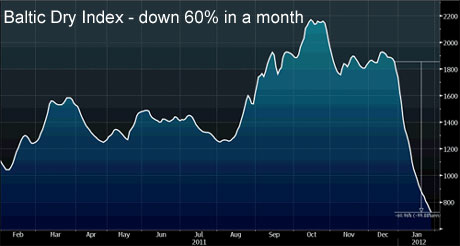Could this be the most bearish statistic in the world right now?
Over the past month, one of the world’s key leading economic indicators has tumbled in value by 60%.
That’s not a misprint.
I’m talking about the Baltic Dry Index (BDI). It has been falling now for 27 trading days in a row. That’s since the second week in December.
So what is the BDI all about? And is this plunge something we should be worrying about?
The Baltic Dry Index has tumbled
The BDI is a key barometer of global freight activity. It’s published by London’s Baltic Exchange, the world’s leading market for buying and selling shipping contracts.
The BDI covers 26 major shipping routes. It measures the cost of transport space (shipping rates) on so-called ‘dry bulk carriers’. These carry cargoes of raw materials such as coal, grain, timber, steel and iron ore.
If the BDI rises, it indicates that shipping rates are rising, due to increased demand for transport space for raw materials. If more raw materials are being shipped, it suggests that factories are seeing higher demand for their finished products and so are planning to make more.
This makes the BDI a key leading economic indicator. Rising shipping rates suggest that manufacturing activity is improving, even before it shows up in the official statistics.
On the flipside, a drop in the BDI could suggest that worldwide demand for shipping space – and therefore, for raw materials – is falling. That in turn indicates that the global economy must be about to slow down.
But 2012 has already seen something much worse than a mere slip. The BDI has collapsed in just a month, as the chart below shows.

Source: Bloomberg
And if you drill into the details, the picture looks even bleaker.
Some of the world’s biggest ships are known as Capesize vessels. They are so called because they’re too big for the Suez Canal and have to travel around the Cape of Good Hope or Cape Horn.
Shipping rates for these vessels have plunged by an incredible 75% so far this year.
So is the global economy about to implode?
Bad news for shipowners
The answer isn’t quite that simple. For one thing, the BDI can be very volatile – much more so than the economy overall. Previous massive drops in the index haven’t always resulted in a re-run of the Great Depression.
That’s because the BDI isn’t just about transport demand. It’s also about transport supply. Remember, the BDI measures the cost of hiring space on a ship. So if you double the number of ships, then demand for raw materials could remain static and perfectly healthy. But shipping rates, and therefore the BDI, would (in theory) fall in half.
And the fact is that right now, there are far too many ships in the world.
Prior to 2008, when the global economy seemed to be booming, dry bulk shipowners got rather over-excited. They convinced themselves that the good times would last for several more years. So – pretty much all at the same time – they placed lots of orders for ships.
Many of those vessels have now been completed and are becoming available for hire. Extra shipping space equivalent to 23% of the existing fleet is due to be delivered this year, according to Macquarie Research. That’s “too much capacity in the face of more modest growth of trade volumes”.
In other words, it’s no great surprise the BDI has fallen back. What’s more, says Credit Suisse, there’ll be no respite from the oversupply of dry bulk ships until next year at the very earliest. Even then, the existing fleet will still grow by 9% as new ships are delivered. That could still be tough for the market to absorb.
But the rest of us can’t relax about it
Clearly, this is all bad news for shipowners. But surely it means that the rest of us can just ignore this scary message from the BDI?
Actually, no, we can’t. The trouble is that the extra ships aren’t enough by themselves to explain this plunge. As Louis Basenese points out on Wall Street Daily, the Harpex – an index of shipping rates for container ships, which carry finished goods – has also plunged, even although the supply of container ships is little changed in the past six months.
Meanwhile, Nick Bullman at risk consultant Check Risks tells Financial News that “this collapse looks similar to the falls we saw in the Baltic Dry ahead of the recessions of the late 1970s and early 1990s – but this drop is actually steeper”.
Continues Bullman: “this is signalling… that the world economy is slowing down much more quickly than people have been thinking”.
Why? It all points to China. The country is the biggest importer of raw materials and we know it’s slowing down (as my colleague Cris Sholto Heaton noted yesterday). This plunge in the BDI is another reason to believe that China can’t avoid a hard landing. That’s bound to have a knock-on effect all around the world.
Earlier in January, my colleague John Stepek warned about the danger of “a big disappointment from China this year”. And we went into greater detail on how to protect your wealth from a Chinese slump in a recent issue of MoneyWeek magazine. (If you’re not already a subscriber, subscribe to MoneyWeek magazine.)
Category: Market updates

